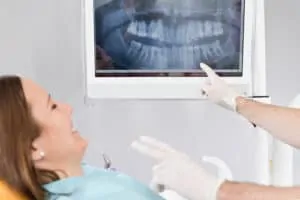 When you visit our El Paso dental office for a checkup, there’s a good chance we may need to take some x-rays of your teeth – especially if it’s your first time seeing us. Both you and your dentist will benefit from the valuable imaging that the x-rays have the power to collect. Since dental x-rays are so valuable, let’s get to know a little bit more about what they are and how they work.
When you visit our El Paso dental office for a checkup, there’s a good chance we may need to take some x-rays of your teeth – especially if it’s your first time seeing us. Both you and your dentist will benefit from the valuable imaging that the x-rays have the power to collect. Since dental x-rays are so valuable, let’s get to know a little bit more about what they are and how they work.
X-rays (also referred to as radiographs) can be 2D or 3D images that quickly become an important part of how your El Paso dentist prepares an accurate treatment plan. The images give us an idea of what’s going on inside your mouth, highlighting your jaw bone health and tooth structure that lies beneath your gums and enamel. It gives us the added ability to find out if something is going on inside your mouth or teeth that’s not 100 percent visible to the naked eye.
With the advancements in dental technology, there are many different types of x-rays available on both traditional film and digitally. Most dental offices have made the switch to digital x-rays because they tend to emit nearly 80 percent less radiation than film x-rays. Many dentists find that digital x-rays free up appointment times and are easy to save to a patient’s file for future reference and use.
Intraoral and Extraoral: The Two Main Categories of X-Rays
Besides having the ability to be either taken on film or stored digitally, x-rays are divided down into two other categories of either being intraoral or extraoral. How it breaks down is pretty straightforward, and it goes something like this:
Intraoral x-rays – involve any imaging taken from INSIDE your mouth
Extraoral x-rays – involve any imaging taken from OUTSIDE your mouth
Intraoral x-rays give us the chance to see really minute or fine details of both your supporting bone and teeth. They are the most common type of dental x-ray and provide an extremely high level of detail to help us diagnose cavities, examine your tooth roots, look over your bony areas, check the status of developing teeth or ones that have yet to erupt, and more.
Extraoral x-rays are usually relied on to help dentists and orthodontists focus on the bones in your head, particularly your upper and lower jaw. Think of them as x-rays that can help us see the big picture of what’s going on in and around your head and mouth. They help us look at growth and development, monitor impacted teeth, and assess bite issues. Extraoral x-rays tend to be less detailed than the intraoral variety.
Are Dental X-Rays Safe?
Most of the x-rays used in dental offices across the country today give off a minimal amount of radiation. It’s important to note that you should always limit your exposure to x-rays and avoid repeated use as it can damage cells over time due to the small, continued radiation aftereffects.
Dental x-rays are certainly safer than ever thanks to advancements in dentistry over the years. Dentists now rely on using lower x-ray dosages, higher quality film, film holders, and well-designed, full-body aprons lined with lead. It’s important to note though that most of the modern dental x-ray technology that’s available today give off very little stray radiation.
We hope you’ve learned a little bit about dental x-rays and how critical they are in helping your dentist in El Paso make sure your mouth is always in optimal health, from your teeth to your bones. X-rays can help you big time because they allow us to detect issues early before they become more costly to fix down the road. If you have any questions about your dental x-rays or when you’re due for a new set, please don’t hesitate to give us a call.
He was excellent and pulled my wisdom tooth in less than 2 min. w/o chipping it. The service was good too.
Great dentist experience! While they do take my insurance, unfortunately, they are not part of my network, however, I liked them so much I will continue to see them.
We were very impressed with the helpful and friendly staff at this dental office.
I was very impressed and thankful with the service provided.
I’m 60 years old and I hated to go to the dentist, and put off going for a long time. But let me tell you Dr. Rizk is the best dentist I’ve ever had. I would of gone years ago. A no pain Dr. – thank you!
I frequently talk to my patients about the different types of dental crowns available to restore their teeth. Understanding the different crown materials available helps you make an informed decision about your dental care. Let me share my professional insights about your various crown options and help you determine which... Read More...
As a dentist practicing in El Paso, I often discuss dental crown cost without insurance with my patients. I understand that cost considerations play a significant role in dental treatment decisions, and I believe in providing transparent information about pricing and payment options. The dental crown cost without insurance typically... Read More...